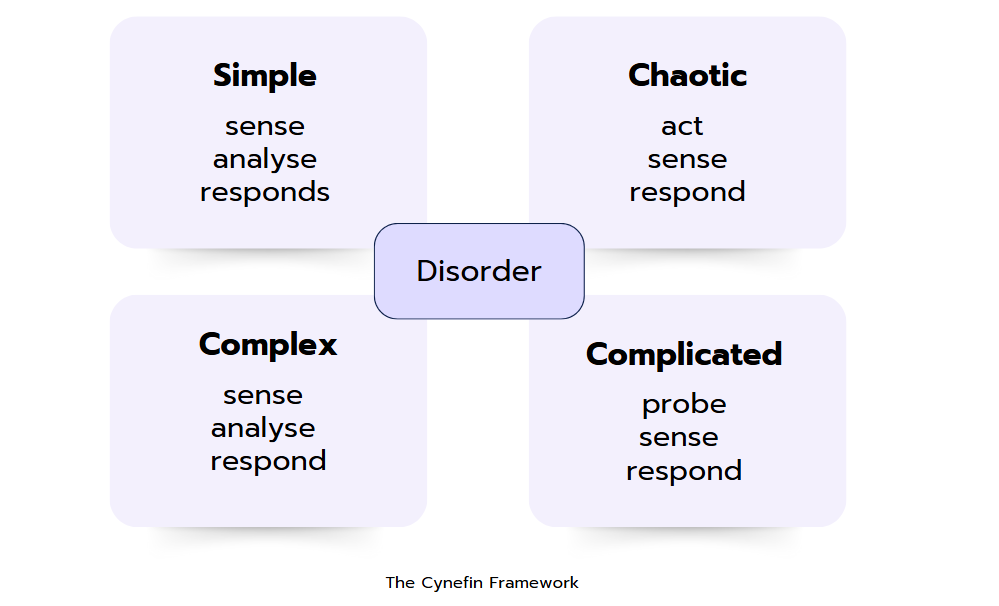For graduates aspiring to embark on a career in consulting, understanding and effectively navigating complex situations is essential. The Cynefin Framework (pronounced: Kin-ev-in) provides a powerful tool for consultants to make sense of different problem domains and determine appropriate approaches.
In this article, we will explore the Cynefin Framework, its sections - Simple, Complicated, Complex, and Chaotic and the Disorder domain. Additionally, we will provide an example of how the framework can be applied in the consulting industry.
Understanding the Cynefin Framework
The Cynefin Framework, developed by Dave Snowden, offers a sense-making model to categorize problem areas based on their levels of complexity and uncertainty (the two “basis elements” of the framework).
It helps consultants identify the appropriate management and decision-making approaches in five different contexts that result in four areas and a center unit:
- Simple Domain: Best Practices and Standard Operating Procedures
In the Simple domain, problems are clear-cut, predictable, and easily resolved using established best practices and standard operating procedures. Consultants can rely on known solutions and established rules to address challenges within this domain. - Complicated Domain: Expertise and Analysis
The Complicated domain involves issues that require expertise and analysis to determine the most suitable solutions. There may be multiple valid approaches, but they require careful investigation, expert opinions, and data analysis to make informed decisions. - Complex Domain: Emergence and Adaptation
The Complex domain is characterized by uncertainty, ambiguity, and a lack of clear cause-and-effect relationships. Consultants must navigate this domain by probing, sensing, and responding to emergent patterns. Multiple perspectives, experimentation, and adaptive strategies are crucial in dealing with complex problems. - Chaotic Domain: Urgency and Rapid Response
The Chaotic domain represents situations of extreme uncertainty and urgency, where there is no apparent order. Consultants must act swiftly and decisively to establish stability and restore order. This may involve making quick decisions, containing crises, and stabilizing the situation. - Disorder: Transition and Uncertainty
The Disorder domain serves as a center unit and describes the transition state, representing a lack of clarity about which domain a problem falls into. It highlights the need for consultants to identify and understand the nature of the problem before determining an appropriate approach.

Applying the Cynefin Framework in the Consulting Industry
Let's consider a case where a consulting firm is working with a global manufacturing company facing a significant disruption in its supply chain:
- Simple:
The consulting team identifies that the supply chain disruption is due to a known issue—a breakdown in communication between departments. They can apply a predefined set of best practices and standard operating procedures to address the problem and restore communication channels. - Complicated:
Upon further investigation, the consulting team discovers that the disruption is caused by a breakdown in a critical supplier relationship. They bring in experts and conduct a detailed analysis of alternative solutions, such as identifying new suppliers or renegotiating contracts, based on the company's specific requirements. - Complex:
As the investigation deepens, the consulting team realizes that the disruption is a result of multiple interconnected factors, including geopolitical events and market volatility. They facilitate diverse perspectives and experimentation to explore adaptive strategies, such as diversifying the supplier base, implementing risk mitigation measures, and leveraging emerging technologies for real-time supply chain visibility. - Chaotic:
In a worst-case scenario, if the disruption escalates into a chaotic situation, such as a natural disaster or political crisis, the consulting team's focus shifts to rapid response and containment. They assist the company in activating crisis management protocols, establishing alternative supply routes, and stabilizing the situation to restore order.
Mastering the Cynefin Framework
The Cynefin Framework is a leader's framework for decision making. It equips consultants with a powerful sense-making tool to navigate complexity and make informed decisions in different problem domains. By understanding the characteristics of the Simple, Complicated, Complex, and Chaotic domains, consultants can apply appropriate strategies and approaches to address diverse challenges.
As graduates embarking on a consulting career, mastering the Cynefin Framework will enable you to effectively analyze and solve complex problems, bringing value to clients in an ever-changing business landscape.

